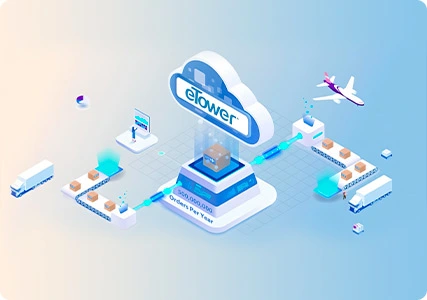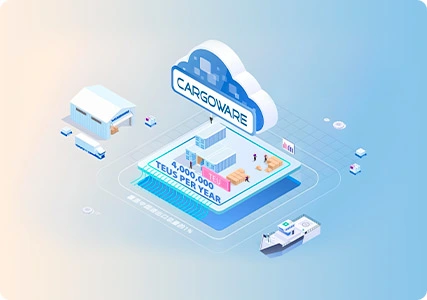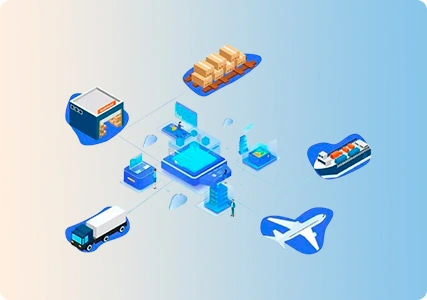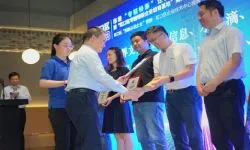The European Union recently announced that the third version of the Import Control System 2 (ICS2) will come into force on June 3 this year, introducing new requirements for goods arriving in or passing through the EU, including goods transported by sea, rail and road. The second version of ICS2, which will come into force in March 2023, will only apply to goods shipped by air to destinations in the EU27, as well as to Norway, Switzerland and Northern Ireland (irrespective of the country of origin).
ICS2 is the second version of the EU's electronic import clearance system, which is a cargo information forecasting and risk management platform that collects data on all shipments to the EU before they arrive in order to enhance the identification of risks to inbound EU goods and strengthen the security management of imported goods, etc. It is reported that the EU27 currently accounts for about 15% of world merchandise trade, and about trillions of euros of goods are imported into the EU every year.
The third phase window for system use is from June 3, 2024, to September 18, 2025, for different carriers.
What will be the impact of the upcoming Phase III system requirements of ICS2 on cross-border e-commerce and international express delivery?
Some analysts believe that the impact on cross-border e-commerce is more significant. The new system strengthens import security control; cross-border e-commerce sellers exporting to the EU need to pay more attention to the safety and compliance of goods and provide accurate information about the goods in order to pass the customs inspection successfully.ICS2 requires importers to provide detailed information about the goods, including the description of the goods, the value, the number of goods, the place of origin, the manufacturer, the supplier, the consignee, the mode of transportation, etc. so that the customs officials can carry out a more comprehensive and accurate security risk assessment of the goods. And accurate security risk assessment of the goods. The new requirements will also increase the time and cost of the importation process. For those who do not meet the customs declaration requirements, it may lead to the return or detention of goods. Cross-border e-commerce sellers who can provide accurate information about their goods, compliant merchandise, and safe transportation methods will help improve their credibility and competitiveness and, thus, better develop the EU market.
Who will be affected?
ICS2 will directly affect relevant operators, shipping, rail, and road transport companies, final consignees (goods received by sea) located in the EU, freight forwarders and logistics companies, freight forwarders and logistics companies, express transport companies, etc. In addition, ICS2 will indirectly affect all manufacturers, exporters, and individuals transporting goods to or passing through the EU, as they will have to provide necessary information to directly affected economic operators.
If the operator is not prepared in time, the goods will be intercepted at the EU customs border, and the customs authorities will not clear the problematic goods.
To comply with the EU's Import Control System 2 (ICS2) regulations, shipping company OOCL informs customers that they need to provide the following additional information in the Shipping Instruction (SI) for submission by the carrier:
● HS commodity code (6 digits): a standard code used to identify goods in international trade.
● Detailed description of the goods: Provide a specific, complete, and accurate description so that customs authorities can identify the goods.
● EORI of the consignee within the EU: EU Economic Registration and Identification Number, which is a unique number throughout the EU and is issued by the customs of EU member states to import and export companies or personnel.
● Consignee's detailed address, including street name, city, province, postal code, and country.
Accurate order information highlights the importance at this point. WallTech has launched the Order Information Integration Management module, which can realize the following functions:
● Realizes the whole process synergy and improves the overall coordination of business processes.
● Improved real-time and visibility: Real-time integration of order information enables logistics software to monitor and track the status and location of orders in real time. This improves real-time visibility into operations, helping to identify and respond to potential issues in a timely manner and improving business responsiveness.
● Adapting to market changes: As market demand changes, logistics businesses need to be more flexible in adjusting their operational strategies. Order information integration makes it easier for logistics software to adapt to changes in the marketplace. Obtaining and processing order information in real-time helps to make timely adjustments to transportation plans, inventory management, etc., to better meet market demand.
Overall, order information integration is an indispensable part of modern logistics software, which improves business synergy, reduces errors, increases real-time visibility, and helps logistics companies respond more flexibly to market challenges, improve operational efficiency, and enhance customer service levels. If you have some questions about logistics software, you can contact us!










